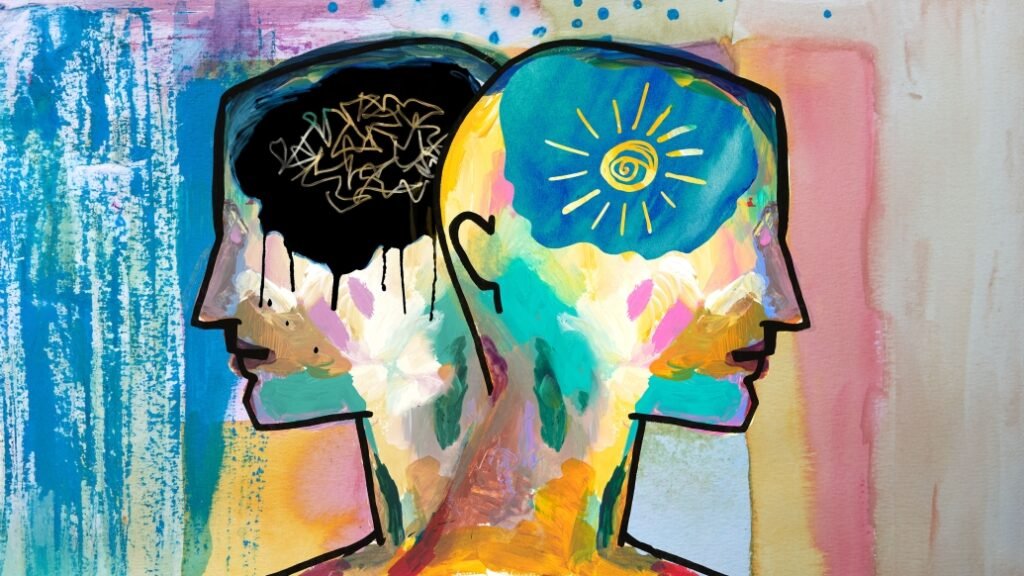Navigating the world of mental health diagnoses can be challenging, especially when symptoms of different conditions seem to overlap. Two of the most commonly compared and misunderstood disorders are Attention-Deficit/Hyperactivity Disorder (ADHD) and Bipolar Disorder. While both conditions can impact mood, behavior, and overall functionality, understanding their differences and potential comorbidities is crucial. This article will explore the distinctions between ADHD vs Bipolar, delve into the complex relationship of ADHD and Bipolar when they coexist, and shed light on the challenges of diagnosing individuals with symptoms of both ADHD and Bipolar .
ADHD vs Bipolar : Key Differences in Symptoms and Diagnosis
Understanding the differences between ADHD and Bipolar Disorder is crucial, as the two conditions, while distinct, often share overlapping symptoms that can lead to misdiagnosis.
Symptoms of ADHD:
ADHD primarily affects attention, impulsivity, and hyperactivity. Key symptoms include:
- Difficulty focusing or sustaining attention.
- Impulsive behavior, such as acting without thinking.
- Restlessness or an inability to sit still.
- Disorganization and forgetfulness.
These symptoms are typically constant and present from childhood, impacting multiple aspects of daily life.
Symptoms of Bipolar Disorder:
Bipolar Disorder is characterized by dramatic shifts in mood, energy, and behavior, divided into manic and depressive episodes:
- Manic episodes: Elevated or irritable mood, increased energy, reduced need for sleep, and impulsive decision-making.
- Depressive episodes: Low energy, sadness, feelings of hopelessness, and difficulty concentrating.
Unlike ADHD, the symptoms of Bipolar Disorder are episodic and can alternate between extremes, often with symptom-free periods in between.
key Diagnostic Differences between Adhd and Bipolar :
- Onset and Duration: ADHD symptoms typically emerge in early childhood and persist consistently, while Bipolar symptoms may appear later and occur in episodes.
- Mood Fluctuations: Bipolar Disorder involves distinct manic and depressive episodes, whereas ADHD may involve emotional dysregulation but lacks defined mood episodes.
- Energy Levels: While hyperactivity in ADHD is chronic, heightened energy in Bipolar Disorder is episodic and tied to mania.
Accurate diagnosis requires a comprehensive evaluation, as misdiagnosing ADHD as Bipolar—or vice versa—can lead to ineffective treatment plans. Recognizing the unique characteristics of each disorder helps clinicians provide tailored care for better outcomes.

ADHD and Bipolar : Can These Conditions Coexist?
The coexistence of ADHD vs Bipolar Disorder, known as comorbidity, is a topic of growing interest in the field of mental health. While these two conditions have distinct features, they can overlap, making diagnosis and treatment more complex.
Understanding Comorbidity
ADHD and Bipolar Disorder can coexist in some individuals, with studies suggesting that the rate of comorbidity may range between 10% and 20%. When both conditions are present, symptoms often interact, leading to a more complicated clinical picture. For instance, impulsivity from ADHD may intensify during manic episodes associated with Bipolar Disorder, making it harder to manage either condition.
Why Comorbidity Happens
The reasons behind this comorbidity are not fully understood, but genetic and neurobiological factors play a significant role. Both disorders are linked to dysregulation in brain chemicals, such as dopamine and serotonin, and they often run in families, indicating a shared genetic predisposition.
Challenges in Diagnosis
Diagnosing ADHD and Bipolar Disorder together can be tricky due to overlapping symptoms:
- Emotional dysregulation in ADHD can resemble the mood swings of Bipolar Disorder.
- Manic symptoms, such as impulsivity and hyperactivity, may mimic ADHD traits.
- ADHD’s constant hyperactivity contrasts with the episodic nature of Bipolar manic episodes, but the distinction can be subtle.
Careful evaluation by a mental health professional, considering the history and pattern of symptoms, is essential for accurate diagnosis.
Adhd vs Bopilar : Impact on Treatment
When ADHD and Bipolar coexist, treatment requires a nuanced approach. Mood stabilization often takes priority, as untreated Bipolar symptoms can worsen impulsivity and attention issues. Medications, such as mood stabilizers or antipsychotics, are commonly used alongside stimulants or non-stimulants for ADHD, under close supervision. Therapy, including cognitive-behavioral therapy (CBT), can help manage emotional dysregulation and develop coping strategies for both conditions.
Understanding the coexistence of ADHD vs Bipolar Disorder highlights the importance of a comprehensive, individualized treatment plan. With the right support, individuals can effectively manage both conditions and improve their quality of life.
Bipolar and ADHD: Understanding Their Shared Symptoms
Bipolar Disorder and ADHD are two distinct conditions, yet they share several overlapping symptoms that can make distinguishing between them challenging. Recognizing these shared traits is crucial for accurate diagnosis and effective treatment.
Key Shared Symptoms
- Impulsivity:
Both conditions can involve impulsive behavior, leading to actions taken without forethought. In ADHD, impulsivity is often chronic and related to difficulty with self-regulation, while in Bipolar Disorder, it is typically heightened during manic episodes. - Emotional Dysregulation:
Intense emotions and rapid mood changes are common in both disorders. In ADHD, this may manifest as frustration or anger over small triggers, whereas in Bipolar Disorder, it aligns more with dramatic shifts between mania and depression. - Difficulty Concentrating:
Trouble focusing is a hallmark of ADHD but can also occur during depressive or manic episodes in Bipolar Disorder. In Bipolar Disorder, it tends to fluctuate with mood states, whereas in ADHD, it is a more persistent issue. - Restlessness or Hyperactivity:
Hyperactivity in ADHD is a core symptom that can appear as physical fidgeting or an inability to stay still. In Bipolar Disorder, restlessness may emerge during manic phases, often accompanied by an elevated energy level and a sense of urgency.

How Shared Symptoms Can Lead to Misdiagnosis Bipolar and adhd ?
The overlapping nature of these symptoms can result in one condition being mistaken for the other. For instance:
- A manic episode in Bipolar Disorder may be confused with hyperactivity in ADHD.
- Emotional outbursts due to ADHD can be mistaken for mood instability typical of Bipolar Disorder.
Adhd vs Bipolar : Distinguishing Between the Two
The key lies in examining the pattern and context of symptoms:
- ADHD symptoms are generally consistent and appear in childhood.
- Bipolar symptoms are episodic, involving distinct periods of mania and depression.
Why Accurate Diagnosis Matters ?
Misdiagnosis can lead to ineffective treatments. For example, stimulant medications for ADHD might worsen manic symptoms in Bipolar Disorder if mood stability is not first addressed.
By understanding the shared symptoms of Bipolar Disorder and ADHD, clinicians and individuals can better identify the subtle differences that set these conditions apart, paving the way for proper treatment and improved outcomes.
The Impact of ADHD and Bipolar on Daily Life
Living with ADHD or Bipolar Disorder can significantly influence daily routines, relationships, and overall quality of life. When both conditions coexist, these challenges can become even more pronounced, requiring tailored strategies to manage their impact effectively.
Challenges in Daily Life with ADHD
ADHD primarily affects attention, organization, and impulse control, leading to:
- Difficulty Staying Focused: Tasks at work or school may go unfinished due to constant distractions.
- Disorganization: Everyday responsibilities, such as managing schedules or keeping track of belongings, can feel overwhelming.
- Impulsivity: Quick decisions without considering consequences may lead to financial issues or strained relationships.
- Emotional Regulation: Small frustrations may lead to intense emotional reactions, impacting social interactions.
Challenges in Daily Life with Bipolar Disorder
Bipolar Disorder introduces episodic mood changes that can disrupt routines and relationships, such as:
- Manic Episodes: Excessive energy, racing thoughts, and impulsivity during mania can lead to risky behavior or burnout.
- Depressive Episodes: Feelings of hopelessness and fatigue during depression can make it hard to maintain responsibilities or connect with loved ones.
- Interpersonal Struggles: The unpredictability of mood swings can strain relationships, as friends or family may struggle to understand the condition.
When ADHD and Bipolar Coexist ?
For individuals dealing with both ADHD and Bipolar Disorder, the impact on daily life can be compounded:
- Heightened Impulsivity: Impulsive tendencies from ADHD may intensify during manic phases.
- Mood and Focus: Emotional instability from Bipolar Disorder can worsen ADHD-related concentration issues.
- Routine Disruptions: The episodic nature of Bipolar Disorder can make establishing the consistent routines needed to manage ADHD even more challenging.
Coping Strategies for Managing Daily Life
- Structured Routines: Establishing clear schedules can help minimize disorganization and create stability.
- Medication Management: Adhering to prescribed treatments for both conditions can reduce symptoms and improve functioning.
- Therapy Support: Cognitive-behavioral therapy (CBT) or similar approaches can provide tools for emotional regulation and managing impulsivity.
- Self-Care Practices: Regular exercise, healthy eating, and mindfulness practices can stabilize mood and improve focus.
- Support Networks: Connecting with understanding friends, family, or support groups can alleviate the emotional toll of these conditions.
Understanding the impact of ADHD and Bipolar Disorder on daily life emphasizes the importance of early diagnosis, individualized treatment plans, and consistent support to help individuals lead fulfilling lives.
Bipolar vs ADHD in Children: Challenges in Early Diagnosis
Diagnosing mental health conditions in children is inherently complex, especially when two conditions like Bipolar Disorder and ADHD share overlapping symptoms. Understanding the unique challenges of diagnosing Bipolar and ADHD in children is crucial for ensuring appropriate treatment and support.
Why Early Diagnosis is Challenging?
- Symptom Overlap:
Both conditions present symptoms that can appear similar, such as impulsivity, emotional outbursts, and restlessness. This overlap can lead to misdiagnosis or delays in identifying the correct condition. - Developmental Factors:
Children naturally exhibit behaviors such as hyperactivity, mood swings, and difficulty focusing, which can mimic symptoms of both ADHD and Bipolar Disorder. Distinguishing normal developmental behaviors from clinical symptoms requires careful evaluation. - Episodic vs. Persistent Symptoms:
- In ADHD vs Bipolar , symptoms like inattention and hyperactivity are consistent and appear across multiple settings (home, school).
- In Bipolar Disorder, symptoms are episodic, with manic or depressive episodes occurring sporadically. However, these episodes can be subtle in children, complicating diagnosis.
- Emotional Dysregulation:
Emotional outbursts in ADHD may resemble the intense mood swings seen in Bipolar Disorder. Without a clear understanding of symptom patterns, it can be difficult to differentiate between the two.
Key Indicators for Differentiation
- Onset and Duration: ADHD symptoms typically emerge early, often before age 7, and are constant. Bipolar symptoms may appear later and involve noticeable shifts in energy and mood.
- Family History: A family history of mood disorders may increase the likelihood of Bipolar Disorder, while a history of ADHD might suggest the presence of that condition.
- Energy Levels: ADHD-related hyperactivity is steady, while heightened energy during Bipolar mania is episodic and often accompanied by grandiosity or risk-taking behavior.

The Importance of Accurate Diagnosis
An accurate diagnosis is essential for developing an effective treatment plan. Misdiagnosing Bipolar Disorder as ADHD can lead to the use of stimulant medications, which might worsen manic symptoms. Conversely, treating ADHD as Bipolar Disorder could overlook core attention and hyperactivity issues, delaying academic and social progress.
Steps Toward Accurate Diagnosis
- Comprehensive Evaluations: Using input from parents, teachers, and clinicians helps paint a clearer picture of symptom patterns.
- Behavioral Observation: Monitoring behaviors over time can help distinguish between consistent ADHD symptoms and episodic Bipolar patterns.
- Multidisciplinary Approach: Collaboration between pediatricians, psychologists, and psychiatrists ensures a thorough and balanced assessment.
Diagnosing Bipolar and ADHD in children requires careful observation, patience, and a nuanced understanding of each condition. Early and accurate identification allows for tailored interventions, empowering children to thrive academically, socially, and emotionally.
Treatment Approaches for ADHD vs Bipolar Disorders
ADHD vs Bipolar Disorder require distinct treatment approaches tailored to their unique characteristics. Understanding the differences in managing these conditions is crucial for effective care, especially when symptoms overlap or coexist.
| Aspect | ADHD Treatment | Bipolar Disorder Treatment |
| Primary Medications | – Stimulants: Methylphenidate (Ritalin), Amphetamines (Adderall) to improve focus and reduce hyperactivity. – Non-Stimulants: Atomoxetine (Strattera), Guanfacine (Intuniv) for individuals who do not respond well to stimulants or experience side effects. | – Mood Stabilizers: Lithium for stabilizing both manic and depressive episodes. – Anticonvulsants: Valproate (Depakote), Lamotrigine (Lamictal) to manage mood swings. – Antipsychotics: Quetiapine (Seroquel), Aripiprazole (Abilify) for manic or mixed episodes. |
| Psychotherapy | – Cognitive-Behavioral Therapy (CBT): Helps with developing strategies to manage focus, impulsivity, and emotional regulation. – Parent Training: Equips parents with techniques to manage ADHD in children. – School-Based Interventions: IEPs (Individualized Education Programs) to support academic success. | – Cognitive-Behavioral Therapy (CBT): Focuses on recognizing triggers for mood episodes and developing coping mechanisms. – Interpersonal and Social Rhythm Therapy (IPSRT): Encourages maintaining consistent daily routines to stabilize mood. – Family-Focused Therapy: Helps families understand and manage the condition collaboratively. |
| Lifestyle Adjustments | – Regular Exercise: Helps reduce hyperactivity and improve focus. – Healthy Adhd Diet : Maintaining balanced nutrition for sustained energy and concentration. – Time Management Tools: Use of adhd planner , timers, and organizational aids. | – Sleep Hygiene: Prioritizing consistent sleep patterns to prevent mood episode triggers. – Substance Avoidance: Avoiding alcohol, caffeine, and recreational drugs to reduce risks of manic or depressive episodes. – Stress Management: Techniques like mindfulness, yoga, or meditation. |
| Treatment Goals | – Improve focus and attention span. – Reduce impulsive and hyperactive behaviors. – Enhance organizational skills and task completion. | – Stabilize mood swings (manic and depressive episodes). – Prevent relapses and manage triggers. – Improve overall functionality and quality of life. |
| Challenges | – Side effects of stimulants, such as appetite suppression or sleep issues. – Difficulty in maintaining long-term adherence to behavioral strategies. – Misdiagnosis leading to inappropriate treatment. | – Managing side effects of mood stabilizers (e.g., weight gain, fatigue). – Relapse due to non-adherence to medication or lifestyle disruptions. – Difficulty distinguishing manic symptoms from normal energy in children or adolescents. |
| Combination Treatments | – Medication combined with behavioral therapy for comprehensive management. – Collaboration between parents, teachers, and therapists for consistent support. | – Medications alongside psychotherapy to address both mood stabilization and emotional triggers. – Family involvement in therapy to create a supportive environment. |
When ADHD vs Bipolar Disorder Are Misdiagnosed
Misdiagnosing ADHD and Bipolar Disorder is not uncommon, as both conditions share overlapping symptoms, such as impulsivity, mood changes, and difficulty concentrating. However, a misdiagnosis can lead to ineffective treatments, worsening of symptoms, and increased distress for the individual.
Why Misdiagnosis Happens
- Symptom Overlap:
- Impulsivity: Present in both conditions but stems from different causes. ADHD vs bipolar impulsivity is chronic, while in Bipolar Disorder, it occurs during manic episodes.
- Emotional Dysregulation: Outbursts of anger or sadness may look similar in both disorders but differ in frequency and triggers.
- Lack of Episodic Evaluation:
Bipolar Disorder features episodic mood swings (mania and depression), whereas ADHD symptoms are consistent. Misdiagnosis can occur if clinicians fail to evaluate mood patterns over time. - Developmental Factors:
In children, normal developmental behaviors such as high energy or temper tantrums can resemble symptoms of both disorders, complicating diagnosis. - Coexisting Conditions:
ADHD vs Bipolar Disorder can coexist, making it difficult to differentiate whether symptoms belong to one or both conditions.
Adhd vs Bipolar : Consequences of Misdiagnosis
- When ADHD is Misdiagnosed as Bipolar Disorder:
- Inappropriate Medication: Mood stabilizers or antipsychotics prescribed for Bipolar Disorder may not address ADHD symptoms, leaving attention and impulsivity issues untreated.
- Emotional Impact: The individual may face unnecessary stigma associated with a Bipolar diagnosis.
- Delayed Academic and Social Progress: Without proper ADHD treatment, challenges in school or work may persist.
- When Bipolar Disorder is Misdiagnosed as ADHD:
- Exacerbation of Manic Symptoms: Stimulant medications for ADHD can worsen mania, leading to increased risk-taking or aggression.
- Missed Opportunity for Mood Stabilization: Without proper treatment for Bipolar Disorder, mood episodes can escalate in severity.
- Emotional Turmoil: Mismanagement of depressive episodes may increase feelings of hopelessness or suicidal ideation.
Key Diagnostic Considerations
- Pattern Recognition:
- ADHD symptoms are steady and present across multiple settings (home, school, work).
- Bipolar Disorder symptoms are episodic, with manic and depressive phases.
- Detailed History:
A thorough medical and psychological history helps distinguish between the two. For example, ADHD typically begins in childhood, while Bipolar Disorder may emerge later. - Family History:
Bipolar Disorder is more likely in families with a history of mood disorders, while ADHD has strong genetic ties to attention and impulse regulation issues. - Behavioral Observation:
Observing behaviors over time allows clinicians to identify triggers and patterns unique to each disorder.
Steps to Avoid Misdiagnosis
- Comprehensive Evaluations:
Use multiple diagnostic tools, including clinical interviews, questionnaires, and behavior rating scales. - Collaboration Among Professionals:
Psychiatrists, psychologists, and primary care providers should work together for an accurate assessment. - Trial Treatments:
Monitoring responses to medications can help confirm or rule out a diagnosis. For instance, worsening mania may indicate the need to reevaluate a diagnosis of ADHD.
Conclusion
Accurately diagnosing ADHD vs Bipolar Disorder requires a nuanced understanding of their differences and similarities. A careful, individualized approach to diagnosis and treatment not only avoids the pitfalls of misdiagnosis but also ensures better outcomes for individuals navigating these conditions.


